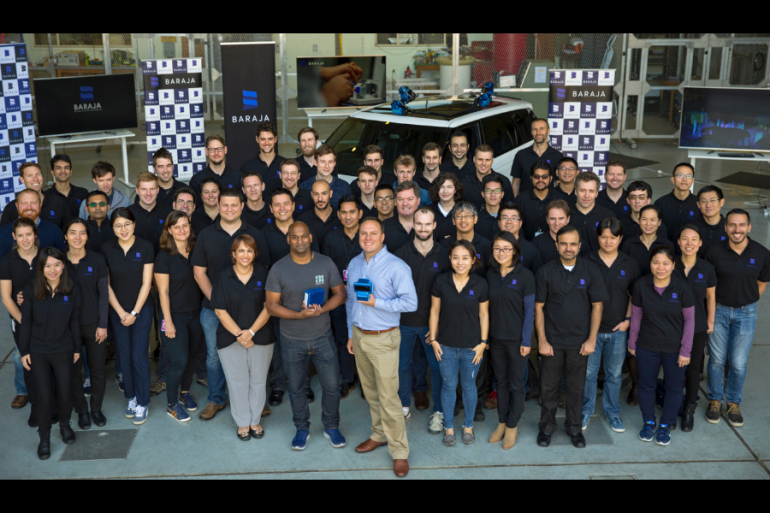Sydney startup Baraja has closed out a US$32 million (almost $45 million) Series A funding round, raising funding from Sequoia China, Blackbird Ventures, and Main Sequence Ventures.
Founded in 2015 by Federico Collarte, CEO, and Cibby Pulikkaseril, CTO, to solve the problems faced by existing LiDAR (light detection and ranging) systems used to give autonomous vehicles sight, Baraja last July launched its solution, Spectrum-Scan LiDAR.
Most LiDAR systems work by firing pulses of laser light from an object and measuring the return times of the reflected pulses to then build a 3D map of the object’s surroundings, via rotating lasers or moving mirrors. These, however, can cause issues with reliability due to vibration and shock.
Baraja’s technology, on the other hand, sees a wavelength-tuneable laser connected to prism-like optics through optic fiber cable. According to Baraja, the light is then naturally deflected in different directions when it reaches the optics, eliminating the need for the rotating mechanisms and moving mirrors.
The cofounders got their inspiration for the system from their years working in the telecommunications industry: their Spectrum-Scan LiDAR is built with off-the-shelf components, including the silica-glass found in smartphone cameras and telecom-grade lasers that power the internet.
With the startup counting over 60 employees in offices across Sydney, San Francisco, and Shanghai, the funding will go towards scaling production, new hires, and expansion across Europe and Asia.
Sequoia China partner Steven Ji, who has joined Baraja’s board of directors in hand with the funding, said, “Everyone understands the challenges for traditional LiDAR.
“They’re prohibitively expensive, difficult to manufacture at scale, and need to be incredibly robust. These problems need to be solved for the fully-autonomous vehicle to become a reality, which is why we’re so excited to be working with Baraja.”
Collarte said the company’s investors are “ideal partners” to accelerate Baraja’s growth in the autonomous vehicle space.
“We’re thrilled to be working with partners that not only bring capital, but vast strategic experience to our team,” he said.
Blackbird Ventures had previously backed Baraja’s seed funding round in 2016.
The funding follows South Australian company Cohda Wireless last October running a trial of its vehicle-to-everything (V2X) technology in Adelaide, which saw an autonomous vehicle connected to a vehicle driven by a human.
The autonomous vehicle was able to detect the movements of the other car to successfully avoid a collision at a four-way intersection, when the car driven by the human ran a red light.
Professor Paul Alexander, CTO of Cohda Wireless, said, “We demonstrated that when vehicles are connected to each other using our smart V2X technology, Car 1, the connected autonomous vehicle, would detect that Car 2 is approaching the red light at speed and is probably not going to stop. This allows the connected autonomous vehicle to pre-emptively identify and respond to the threat by slowing down and stopping.”
Cohda’s V2X technology allows vehicles to speak to each other to extend their perception horizon. The technology provides the vehicle with an awareness of its environment and risk factors associated with it, consistently and accurately up to 10 times per second, enabling it to make decisions that a human being would not be capable of making as the driver of the vehicle.”
Image: the Baraja team. Source: Baraja.




















Trending
Daily startup news and insights, delivered to your inbox.